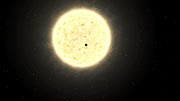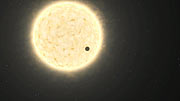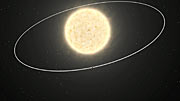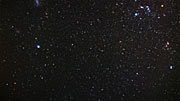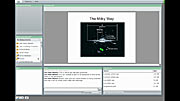Persbericht
Planeet van een ander sterrenstelsel ontdekt
Galactisch kannibalisme brengt een exoplaneet van extragalactische oorsprong binnen het bereik van astronomen
18 november 2010
Een Europees team van astronomen heeft met de 2,2-meter MPG/ESO-telescoop van de ESO-sterrenwacht op La Silla (Chili) een planeet ontdekt bij een ster van een klein sterrenstelsel dat door ons Melkwegstelsel is opgeslokt. De Jupiter-achtige planeet is zeer uitzonderlijk, omdat hij om een ster draait die het einde van zijn leven nadert. Mogelijk staat hij zelfs op het punt om door de ster te worden verzwolgen.
De afgelopen vijftien jaar hebben astronomen bij sterren in onze kosmische omgeving bijna vijfhonderd planeten ontdekt, maar geen daarvan bevindt zich met zekerheid buiten ons Melkwegstelsel [1]. Nu is er echter een planeet van minimaal 1,25 maal de massa van Jupiter [2] ontdekt die om een ster van extragalactische oorsprong draait. De ster maakt deel uit van de zogeheten Helmi-stroom – een groep sterren die oorspronkelijk deel uitmaakte van een dwergstelsel dat door ons Melkwegstelsel is opgeslokt. Deze daad van galactisch kannibalisme moet zich ongeveer zes tot negen miljard jaar geleden hebben afgespeeld. De ontdekking van de exoplaneet wordt vandaag in Science Express gepubliceerd.
‘Deze ontdekking is heel spannend,’ zegt Rainer Klement van het Max-Planck-Institut für Astronomie (MPIA), die verantwoordelijk was voor de selectie van de sterren die onderwerp van dit onderzoek waren. ‘Voor het eerst hebben astronomen een planetenstelsel ontdekt in een sterrenstroom van extragalactische oorsprong. Door de grote afstanden in kwestie zijn er in andere sterrenstelsels nog geen zekere ontdekkingen van planeten gedaan. Maar deze kosmische fusie heeft een extragalactische planeet binnen ons bereik gebracht.’
De ster draagt de aanduiding HIP 13044 en staat, op een afstand van ongeveer 2000 lichtjaar, in de richting van het zuidelijke sterrenbeeld Fornax (Oven). De astronomen ontdekten de planeet, die HIP 13044 b wordt genoemd, door op de kleine, kenmerkende schommelingen te letten die een ster vertoont als er een ander object omheen draait. Voor deze nauwkeurige waarnemingen werd gebruik gemaakt van de nauwkeurige spectrograaf FEROS [3] die aan de 2,2-meter MPG/ESO-telescoop [4] van de ESO-sterrenwacht op La Silla was gekoppeld.
HIP 13044 b is een van de weinige exoplaneten waarvan bekend is dat zij de periode hebben doorstaan waarin hun moederster enorm is opgezwollen nadat zij de voorraad waterstof in haar kern had verbruikt – het zogeheten rodereuzenstadium. De ster is inmiddels weer samengetrokken en verbrandt nu helium in haar kern. Tot nog toe zijn maar weinig van deze ‘horizontale tak’-sterren door planetenjagers onderzocht.
‘Deze ontdekking maakt deel uit van een onderzoek waarbij we systematisch zoeken naar exoplaneten die om stervende sterren draaien,’ aldus Johny Setiawan, eveneens van het MPIA, die het onderzoek leidde. ‘Als we de verre toekomst van ons eigen planetenstelsel erbij betrekken, wordt de ontdekking nog intrigerender. Naar verwachting verandert over ongeveer vijf miljard jaar namelijk ook onze zon in een rode reus.’
HIP 13044 b verblijft dicht bij zijn moederster. Het meest nabije punt van zijn elliptische baan ligt minder dan een sterdiameter van het oppervlak van de ster (oftewel 0,055 maal de afstand zon-aarde). Over elke omloop doet hij slechts 16,2 dagen. Setiawan en zijn collega’s vermoeden echter dat de planeetbaan oorspronkelijk veel wijder is geweest, en dat de planeet pas tijdens het rodereuzenstadium naar de ster toe is opgeschoven.
Het lijkt er op dat planeten die zich dichter bij de ster bevonden, minder geluk hebben gehad. ‘De ster draait relatief snel om haar as voor een ‘horizontale tak’-ster,’ zegt Setiawan. ‘Een mogelijke verklaring is dat HIP 13044 tijdens haar rodereuzenstadium de meest nabije planeten heeft opgeslokt, waardoor zij sneller is gaan draaien.’
Hoewel HIP 13044 b het lot van deze binnenplaneten tot dusverre heeft weten te ontlopen, is zijn voortbestaan allerminst zeker. Zijn moederster zal tijdens het volgende stadium van haar evolutie namelijk opnieuw opzwellen. Dat gebeurt straks wellicht ook met de buitenplaneten van ons zonnestelsel – zoals Jupiter – wanneer de zon het einde van haar leven nadert.
De ster werpt ook interessante vragen op over het ontstaan van reuzenplaneten. Ze bevat namelijk zeer weinig elementen zwaarder dan waterstof en helium – minder dan alle andere sterren waarbij planeten zijn ontdekt. ‘Het is moeilijk om aan de hand van het algemeen geaccepteerde model voor het ontstaan van planeten te verklaren hoe zo’n ster, die nauwelijks zware elementen bevat, een planeet kan hebben gevormd. Planeten rond sterren als deze moeten waarschijnlijk op een andere manier ontstaan,’ besluit Setiawan.
Noten
[1] Er bestaan slechts enkele voorlopige aanwijzingen voor het bestaan van extragalactische exoplaneten. Deze zijn ontdekt via het ‘gravitationele microlenseffect’, waarbij een planeet die precies voor een nog verder weg gelegen ster langs beweegt een subtiele, maar waarneembare ‘lichtflits’ veroorzaakt. Deze ontdekkingsmethode berust echter op één enkele gebeurtenis – het toevallig op één lijn staan van een verre lichtbron, een planetenstelsel en waarnemers op aarde. Geen van deze extragalactische planeetontdekkingen is bevestigd.
[2] Met behulp van de radiale snelheidsmethode kunnen astronomen slechts de minimale massa van een planeet schatten, omdat deze massaschatting mede afhankelijk is van de hoek die haar baanvlak met de gezichtslijn maakt. En die hoek is doorgaans niet bekend. Statistisch gezien ligt de minimummassa echter dicht bij de werkelijke massa van de planeet.
[3] FEROS staat voor Fibre-fed Extended Range Optical Spectrograph.
[4] De 2,2-meter telescoop is sinds begin 1984 in bedrijf op La Silla. Het instrument is voor onbepaalde tijd aan ESO uitgeleend door de Max-Planck-Gesellschaft (MPG). De beschikbare telescooptijd wordt gedeeld tussen MPG- en ESO-programma’s, maar voor bedrijfsvoering en onderhoud van de telescoop is ESO verantwoordelijk.
Meer informatie
Dit onderzoek wordt beschreven in het artikel ‘A Giant Planet Around a Metal-poor Star of Extragalactic Origin’, door J. Setiawan et al., dat op 18 november 2010 in Science Express verschijnt.
Het onderzoeksteam bestaat uit J. Setiawan, R.J. Klement, T. Henning, H.-W. Rix, en B. Rochau (Max-Planck-Institut für Astronomie, Heidelberg, Duitsland), J. Rodmann (European Space Agency, Noordwijk, Nederland) en T. Schulze-Hartung (Max-Planck-Institut für Astronomie, Heidelberg, Duitsland).
ESO, de Europese Zuidelijke Sterrenwacht, is de belangrijkste intergouvernementele sterrenkundeorganisatie in Europa, en het meest productieve astronomische observatorium ter wereld. ESO wordt ondersteund door 14 landen: België, Denemarken, Duitsland, Finland, Frankrijk, Italië, Nederland, Oostenrijk, Portugal, Spanje, Tsjechië, het Verenigd Koninkrijk, Zweden en Zwitserland. ESO voert een ambitieus programma uit, gericht op het ontwerp, de bouw en het beheer van krachtige grondobservatoria die astronomen in staat stellen om belangrijke wetenschappelijke ontdekkingen te doen. ESO speelt ook een leidende rol bij het bevorderen en organiseren van samenwerking op sterrenkundig gebied. ESO beheert drie waarnemingslocaties van wereldklasse in Chili: La Silla, Paranal en Chajnantor. Op Paranal staat ESO’s Very Large Telescope (VLT), de meest geavanceerde optische sterrenwacht ter wereld. Ook is ESO de Europese partner van de revolutionaire telescoop ALMA. Daarnaast is ESO momenteel bezig met ontwerpstudies voor de 42-meter Europese Extremely Large optische/nabij-infrarood Telescoop (E-ELT), die ‘het grootste oog op de hemel’ ter wereld zal worden.
Links
Contact
Johny Setiawan
Max-Planck-Institut für Astronomie
Heidelberg, Germany
Tel: + 49 6221 528 326
E-mail: setiawan@mpia.de
Rainer Klement
Max-Planck-Institut für Astronomie
Heidelberg, Germany
Tel: +49 6221 528384
E-mail: klement@mpia.de
Richard Hook
ESO, La Silla, Paranal, E-ELT and Survey Telescopes Public Information Officer
Garching bei München, Germany
Tel: +49 89 3200 6655
Mob: +49 151 1537 3591
E-mail: rhook@eso.org
Markus Poessel
Public relations Max-Planck-Institut für Astronomie (ESON contact for Germany)
Heidelberg, Germany
Tel: +49 6221 528 261
E-mail: poessel@mpia.de
Rodrigo Alvarez (press contact België)
ESO Science Outreach Network
en Planetarium, Royal Observatory of Belgium
Tel: +32-2-474 70 50
E-mail: eson-belgië@eso.org
Over dit bericht
| Persberichten nr.: | eso1045nl-be |
| Naam: | Exoplanets, HIP 13044 b |
| Type: | Milky Way : Planet |
| Facility: | MPG/ESO 2.2-metre telescope |
| Instruments: | WFI |
Our use of Cookies
We use cookies that are essential for accessing our websites and using our services. We also use cookies to analyse, measure and improve our websites’ performance, to enable content sharing via social media and to display media content hosted on third-party platforms.
ESO Cookies Policy
The European Organisation for Astronomical Research in the Southern Hemisphere (ESO) is the pre-eminent intergovernmental science and technology organisation in astronomy. It carries out an ambitious programme focused on the design, construction and operation of powerful ground-based observing facilities for astronomy.
This Cookies Policy is intended to provide clarity by outlining the cookies used on the ESO public websites, their functions, the options you have for controlling them, and the ways you can contact us for additional details.
What are cookies?
Cookies are small pieces of data stored on your device by websites you visit. They serve various purposes, such as remembering login credentials and preferences and enhance your browsing experience.
Categories of cookies we use
Essential cookies (always active): These cookies are strictly necessary for the proper functioning of our website. Without these cookies, the website cannot operate correctly, and certain services, such as logging in or accessing secure areas, may not be available; because they are essential for the website’s operation, they cannot be disabled.
Functional Cookies: These cookies enhance your browsing experience by enabling additional features and personalization, such as remembering your preferences and settings. While not strictly necessary for the website to function, they improve usability and convenience; these cookies are only placed if you provide your consent.
Analytics cookies: These cookies collect information about how visitors interact with our website, such as which pages are visited most often and how users navigate the site. This data helps us improve website performance, optimize content, and enhance the user experience; these cookies are only placed if you provide your consent. We use the following analytics cookies.
Matomo Cookies:
This website uses Matomo (formerly Piwik), an open source software which enables the statistical analysis of website visits. Matomo uses cookies (text files) which are saved on your computer and which allow us to analyze how you use our website. The website user information generated by the cookies will only be saved on the servers of our IT Department. We use this information to analyze www.eso.org visits and to prepare reports on website activities. These data will not be disclosed to third parties.
On behalf of ESO, Matomo will use this information for the purpose of evaluating your use of the website, compiling reports on website activity and providing other services relating to website activity and internet usage.
Matomo cookies settings:
Additional Third-party cookies on ESO websites: some of our pages display content from external providers, e.g. YouTube.
Such third-party services are outside of ESO control and may, at any time, change their terms of service, use of cookies, etc.
YouTube: Some videos on the ESO website are embedded from ESO’s official YouTube channel. We have enabled YouTube’s privacy-enhanced mode, meaning that no cookies are set unless the user actively clicks on the video to play it. Additionally, in this mode, YouTube does not store any personally identifiable cookie data for embedded video playbacks. For more details, please refer to YouTube’s embedding videos information page.
Cookies can also be classified based on the following elements.
Regarding the domain, there are:
- First-party cookies, set by the website you are currently visiting. They are stored by the same domain that you are browsing and are used to enhance your experience on that site;
- Third-party cookies, set by a domain other than the one you are currently visiting.
As for their duration, cookies can be:
- Browser-session cookies, which are deleted when the user closes the browser;
- Stored cookies, which stay on the user's device for a predetermined period of time.
How to manage cookies
Cookie settings: You can modify your cookie choices for the ESO webpages at any time by clicking on the link Cookie settings at the bottom of any page.
In your browser: If you wish to delete cookies or instruct your browser to delete or block cookies by default, please visit the help pages of your browser:
Please be aware that if you delete or decline cookies, certain functionalities of our website may be not be available and your browsing experience may be affected.
You can set most browsers to prevent any cookies being placed on your device, but you may then have to manually adjust some preferences every time you visit a site/page. And some services and functionalities may not work properly at all (e.g. profile logging-in, shop check out).
Updates to the ESO Cookies Policy
The ESO Cookies Policy may be subject to future updates, which will be made available on this page.
Additional information
For any queries related to cookies, please contact: pdprATesoDOTorg.
As ESO public webpages are managed by our Department of Communication, your questions will be dealt with the support of the said Department.




